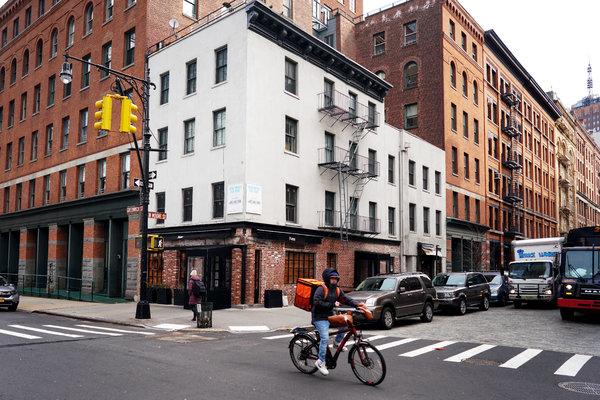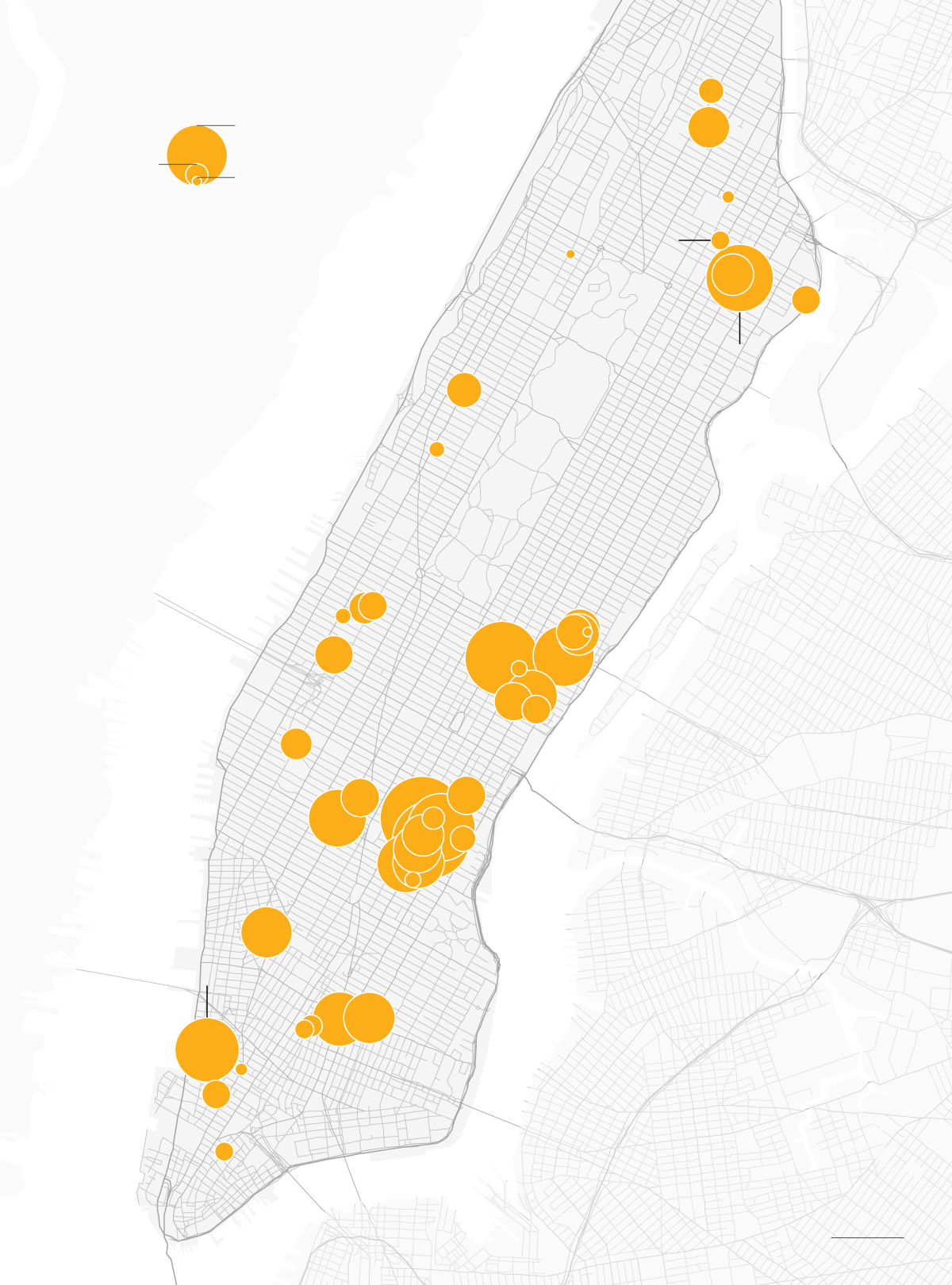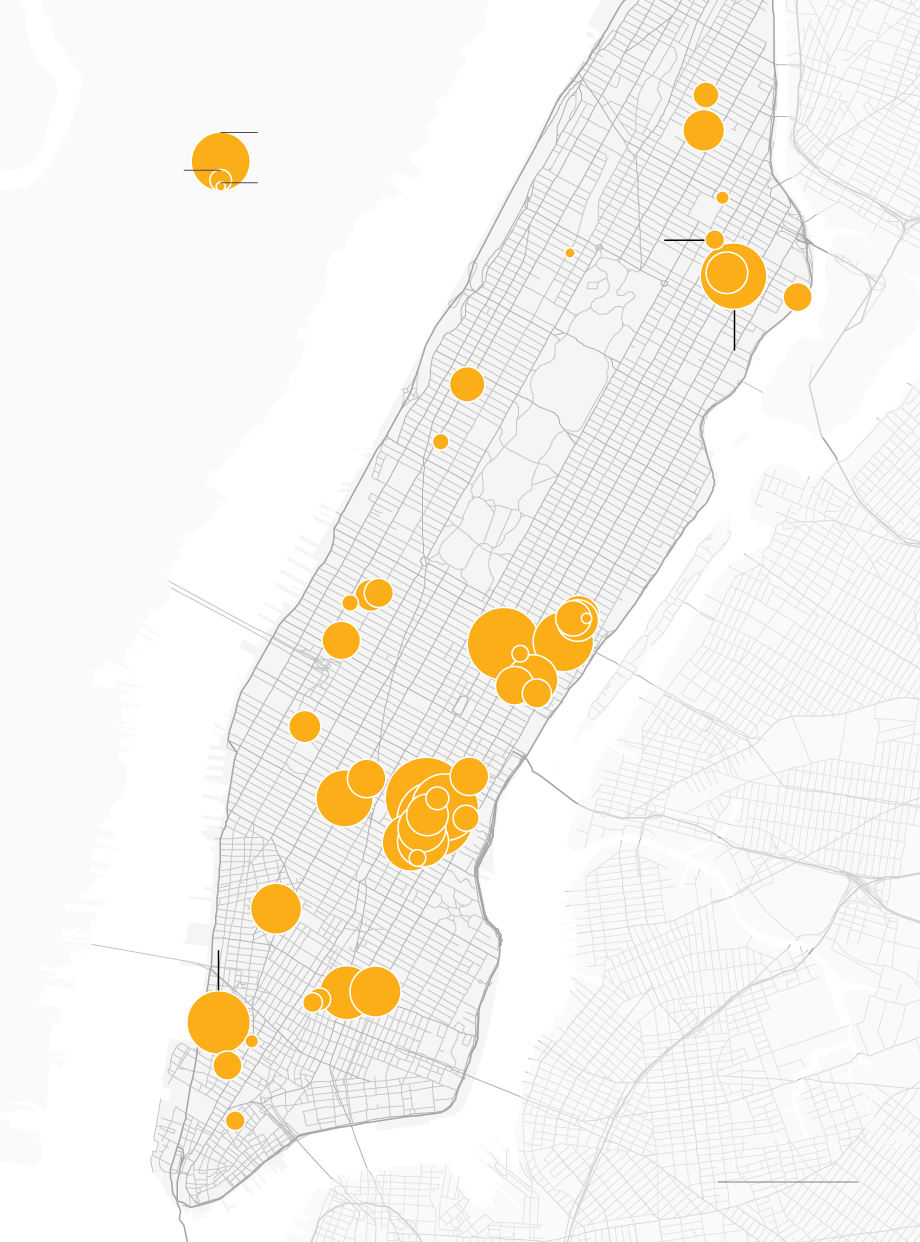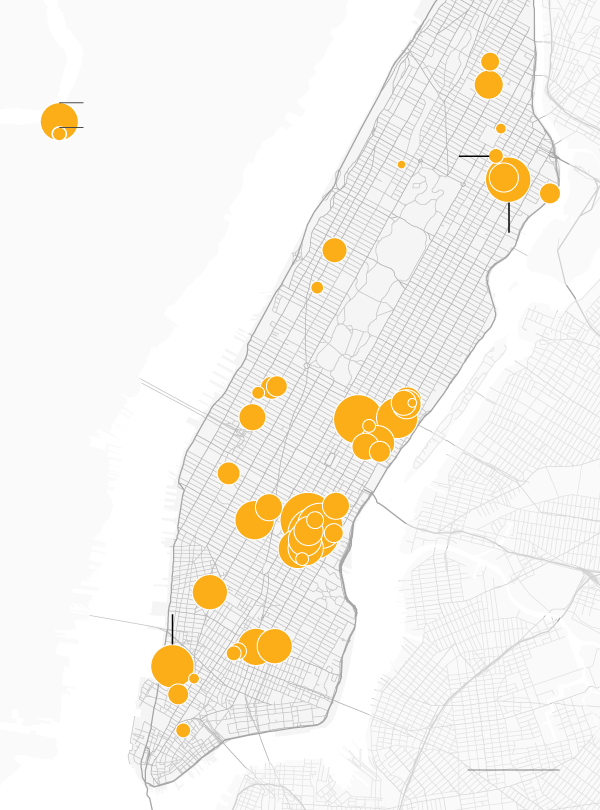[What you need to know to start the day: Get New York Today in your inbox.]
From the outside, there was nothing especially notable about the small white building on the corner of a cobblestone street in TriBeCa. But until recently, it was a crucial location in a sprawling empire.
“Beautiful Loft Prime Tribeca 4BR/2BA Sleep 10,” read the listing on Airbnb for one apartment there.
Two of the three apartments in the building were popular with tourists looking to stay in one of Manhattan’s most desirable neighborhoods — at $600 a night each, they were a bargain for a large group.
But they were also illegal — part of an elaborate real estate scheme to make millions by circumventing state and local laws and Airbnb’s own rules.
The building, on Greenwich Street, was part of a larger enterprise that made more than $20 million in revenue by unlawfully renting 130 Manhattan apartments to almost 76,000 guests through Airbnb, city officials said.
The plot was geared toward getting around city regulations that are intended to keep blocks of apartments from being turned into makeshift hotels that avoid lodging taxes and oversight.
The crackdown on the empire last month was a milestone in the escalating battle between Airbnb and New York City — the company’s largest market in the country. Airbnb condemned the exploitation of its platform, but the scheme showed how the home-sharing site has given opportunists a new kind of hustle.
Airbnb has clashed with other cities. Los Angeles, Amsterdam, Paris and Vancouver, British Columbia, have all passed laws restricting Airbnb rentals. In July, Palma de Mallorca became the first city in Spain to ban Airbnb.
Interviews and documents offer a glimpse at how the New York scheme worked. According to the suit, the ring used multiple misleading identities to dodge Airbnb’s rules, text tourists and book apartments to budget-minded travelers. Addresses were fudged to avoid scrutiny. A cadre of cleaners was apparently recruited through Facebook.
In all, more than 100 Airbnb host accounts and 18 corporations were created to run an illegal hotel business that stretched north from TriBeCa to SoHo, Gramercy, the Upper East Side and Harlem, according to a lawsuit brought by the city.

One apartment on Greenwich Street was advertised on Airbnb as “Beautiful Loft Prime Tribeca 4BR/2BA Sleep 10” for $600 a night.CreditChang W. Lee/The New York Times
New York regulations are supposed to keep apartments from being pulled out of an already-tight rental market to cater to the tourist trade. They specify that it is illegal to rent an entire apartment in most buildings for fewer than 30 days unless the permanent tenant is present while the renter is there.
Posting a unit that should not be listed on Airbnb is a civil offense, not a criminal one, and the city typically issues violations that can result in fines of thousands of dollars; lawsuits are filed in the most egregious of cases. In this lawsuit, the city is seeking more than $20 million from the defendants.
At the center of the scheme was Max Beckman, 35, a former real estate broker, according to the lawsuit. Mr. Beckman, who moved to the United States 18 years ago from Israel, was one of five people accused. There has not been a verdict, and the case is continuing.
Mr. Beckman agreed to be interviewed, making clear that he believed that he did nothing wrong.
“We’re not criminals,” he said at his lawyer’s office, while puffing from a Juul he kept in a black leather pouch fastened to a chain around his neck. He shrugged: “I don’t own a yacht or a big penthouse.”
What he did have was an ambitious, though risky, idea.
How it all began
It was 2012 and Mr. Beckman, in his own telling, was struggling to make it as a real estate broker. He said he had a dismal credit score and $100 to his name when he used that money to pay the application fee for a one-bedroom on the Upper East Side.
He began renting it out, short term, to tourists through Airbnb and pocketed the difference after paying rent. It was a simple business model he would go on to replicate.
“It took off, and I made more money, and then I got another one,” Mr. Beckman said. “I couldn’t stop.”
In 2015, Mr. Beckman quit his job as a real estate broker for Metropolitan Property Group, a brokerage firm in Manhattan, to devote himself full time to his Airbnb venture.
He persuaded two friends who were also brokers at the firm to become his partners, he said. The men, Alon Karasenty and Simon Itah, were also sued by the city. They did not respond to multiple requests for comment.
By the end of the year, the trio was managing dozens of listings on Airbnb, including large spaces in some of the city’s most sought-after neighborhoods — a penthouse overlooking Central Park, a loft in Chelsea — according to court documents.
“We made money, we lost money, we learned,” said Mr. Beckman, a self-described disruptive entrepreneur.
The lawsuit alleged that Mr. Beckman’s former employer, Metropolitan Property Group, and its chief executive officer, Sami Katri, along with his wife, Shely Katri, were also involved.
Some of the 18 corporations that received payouts from Airbnb had been registered using Metropolitan Property Group’s office addresses. The suit also claimed the Katris’ names were linked to two Airbnb accounts and the utility bills for two apartments at 200 East 116th Street in East Harlem, where all seven units were on Airbnb.
But Mr. Beckman said that the addresses were used without the company’s knowledge and that the Katris were not involved.
Douglas Pick, a lawyer for the Katris and the brokerage firm, also denied that his clients were involved and said the city has not provided any evidence that Airbnb had disbursed payments to them. He said the three men had stopped working for the firm by 2015 and had “began operating for themselves.”
Mr. Katri, through his lawyer, said he had partnered with Mr. Karasenty and Mr. Itah to legally lease apartments at the East Harlem building, but was unaware they were rented out through Airbnb.
Yoram Nachimovsky, the lawyer representing the three men and their corporations, said the lawsuit was “a political move by the mayor.”
“Basically, the mayor is being sponsored by these hotel operators and he’s doing what’s in their best interest,” he said.
Christian Klossner, the executive director of the Mayor’s Office of Special Enforcement, which led the investigation, said his office was “here to preserve housing for New Yorkers and to make sure both New Yorkers and visitors are kept safe and treated fairly.”
How it worked
The scheme required leasing scores of apartments.
Some landlords claimed they were deceived, renting apartments to Mr. Beckman and his partners without knowing the units would be used as hotel rooms.
For example, Mr. Beckman signed leases for two apartments in another East Harlem building in late 2017, according to a separate lawsuit filed by the building’s owner last year.
A day after signing the lease, the apartments were on Airbnb under the host names “Cedric” and “Tom & Lisa,” the lawsuit said.
The rent for one apartment was $3,225, but it was on Airbnb for $250 a night. Hypothetically, Mr. Beckman could cover a month’s rent by filling it with tourists for about two weeks.
In just a few months, Mr. Beckman had booked more than 500 guests and generated about $84,000 from the building at 78 East 119th Street, according to the city’s lawsuit.
Some residents in the 10-unit building grew annoyed by strangers constantly showing up with luggage.
“It’s been 3 a.m. and I’ve had people ringing my buzzer to get in,” said Ziograin Correa, 40, who lives in the building with his wife and six children. “They don’t have a key, so they ring my buzzer.”
The city learned that the units were on Airbnb and slapped the landlord with violations last year, meaning daily fines that could have cost about $60,000, according to Gary Wachtel, a lawyer for Orsipel, the company that owns the building.
“I think it’s a terrible burden to expect that a landlord knows what every tenant in a building is doing on a daily basis,” Mr. Wachtel said. He said the landlord was unaware of the Airbnb operation; Mr. Beckman claimed he “never went behind the landlord’s back.”
Mr. Beckman forfeited the apartments after the landlord filed the lawsuit. “We just vacated the apartment,” he said. “I said I’m sorry and moved on.”
Airbnb has long said the majority of its hosts are everyday New Yorkers who rent out a spare bedroom or list their apartment while on a long vacation.
Still, the company has voluntarily taken down more than 5,000 commercial listings since late 2015. The city estimates that about one-third of listings on home-sharing websites are run by commercial operators; Airbnb disputes those numbers.
Under Airbnb’s “One Host, One Home” policy, New Yorkers can list only one apartment, with few exceptions.
But Mr. Beckman and his partners appear to have bypassed that policy by creating host accounts using different email addresses and multiple identities, including those of relatives and some with variations of the same name (“Jacob Itah” vs. “Jacob Itach”).
They also provided Airbnb with incorrect or incomplete addresses for apartments to avoid scrutiny, according to the city’s lawsuit.
Josh Meltzer, the head of public policy for Airbnb in the Northeast, condemned the behavior and acknowledged the limitations of the company’s rules, which he said were intended as a short-term remedy.
“We’re talking about a very narrow set of actors that are working very creatively and very diligently,” he said. “That’s why we’ve supported what I would say is a very restrictive, comprehensive piece of legislation at the state level that would essentially require platform and government to work together to target this type of behavior.”
Airbnb has drawn opposition from the hotel industry. Recently, a federal judge blocked the implementation of a city law that would have required home-sharing services to disclose information about its listings, and the identities and addresses of hosts.
But the legal battle drags on, and Mayor Bill de Blasio announced this week that the city had issued a subpoena for information on 20,000 home-sharing listings in New York.
The mayor and other politicians have argued that Airbnb listings diminish the supply of apartments available to full-time renters, making the city’s affordable housing crisis even worse.
But Mr. Beckman said that he never rented out rent-stabilized units and that his listings did not take apartments away from low-income New Yorkers. The majority of the units were high-end apartments in expensive neighborhoods, he said.
Ultimately, Mr. Beckman believes the city’s tourism industry could benefit if lawmakers allow apartments to be offered on Airbnb and taxed like hotels.
For him, the proof is that he and his associates made it work.
Making millions and rousing suspicion
At its peak, the city claimed, the business run by Mr. Beckman and his partners booked tens of thousands of guests for 55,331 nights over three years across 35 different buildings.
Six buildings each generated more than $1 million in revenue; the top-earner was a residential building in Kips Bay that brought in about $1.8 million, according to the city.
At the beginning, Mr. Beckman said, he decorated the apartments with used furniture, but later was able to afford an interior designer.
He was also able to employ 15 housekeepers who roamed Manhattan tidying up the apartments, he said.
“Responsible and thorough cleaning lady needed!” read one post, along with Mr. Beckman’s phone number, from 2018 on a Facebook group that caters to Russians looking for jobs in New York. Cleaners would earn $500 to $800 per week and get a MetroCard, according to the post.
“They made sure we got five stars,” Mr. Beckman said.
Indeed, most tourists left positive ratings in listings reviewed by The New York Times, although a few lobbed complaints.
“I became suspicious as soon as we entered the building that we had been taken for a bit of a ride,” said Kelly Swift, 31, a teacher from Australia who booked a three-bedroom in TriBeCa. “It was definitely not someone’s home.”
Ms. Swift said she felt unsafe when someone entered the apartment to replace a couch without notice while she was away. She realized the apartment above hers was also a faux hotel after she saw three different groups cycle in and out during her 10-day stay.
“The third group partied every night, and once I had to go up at midnight and ask them to please stop yelling,” Ms. Swift said.
The lease for one of the apartments in the TriBeCa building was signed by Mr. Beckman and his two partners, and the monthly rent checks of $25,000 for both units were mostly paid by different corporations connected to the men, according to court documents.
The landlord, a company presided over by Charles Cohen, terminated the lease in March as a result of the short-term rentals, the lawsuit said. But, according to court documents, Mr. Cohen continued to receive monthly checks until the end of 2018, and the apartments were on Airbnb’s website as late as a few weeks ago.
It was unclear whether landlords were typically aware of the Airbnb operations in their buildings, and Mr. Beckman refused to comment on the matter.
Pressed during an interview, he said, “The landlords themselves were not involved.”
Mr. Cohen, who appeared to have leased apartments in other buildings where the partners listed Airbnbs, did not respond to multiple requests for comment.
The fall of an empire
One night in early January, a police sergeant showed up outside Mr. Beckman’s apartment to serve him with a notice that the city was going to sue him.
Mr. Beckman was not home, so the sergeant left the notice with his wife.
“That day was crazy,” he said.
Since then, Mr. Beckman, who has two children, has been huddling with his lawyers and shuttering his Airbnb operations, terminating dozens of apartment leases.
The city also sued five buildings for not cracking down on Airbnbs managed by Mr. Beckman and his partners despite violations issued by the city.
Abington Properties, the owner of three of the buildings, did not reply to multiple requests for comment. A secretary for Helm Management, which runs the East Harlem building that became a de facto hotel, said the company did not comment on pending litigation.
Mr. Beckman said he intended to reach a settlement with the city, even if that meant paying a hefty fine. He said that, despite the lawsuit, he spoke to The Times because he thought the city had unfairly portrayed him as a criminal.
“There is nothing bad about us,” he said. “That’s why I’m happy to do this interview with you.”
Now, he said, his sights were on “legal new ventures.” Asked to elaborate, he said he was starting a business to sell electric scooters, which are illegal to ride on New York City streets, but could be legalized by the City Council soon.
“The land of opportunities, right?”










